
|   |

|   |
National Theatre Festival - A cross section of contemporary Indian stage - Renu Ramanath e-mail: renuramanath@hotmail.com Images: Courtesy Dept. of Information & Public Relations, Govt. of Kerala Photos by Ravi Kumar, Dept. of Information & PR, Kozhikode April 21, 2011 'Representative!' This will be the single word that would aptly describe the essence of the recently held National Theatre Festival conducted by the Department of Information and Public Relations, Govt. of Kerala, at Kozhikode. It was a theatre festival that was truly representative of the very many streams of contemporary theatre happening across the length and breadth of India. Not only that, the selection committee, headed by the Artistic Director of the Festival, Abhilash Pillai (Dean, Academics, National School of Drama), took minute care to include precise samples of theatre practice that had played major roles in the formation of a contemporary theatre sensibility in India. Augmented with lively sessions of public interaction with the participating directors and artistes along with a series of Theatre Talks that had well-established names from the theatre scenario speak about relevant topics, the NTF-2011 turned out to be a fruitful venture within all the practical restraints faced by the organisers. Organising an event of this magnitude, almost on the very eve of the Assembly polls for which the whole machinery of the Dept. of Information and Public Relations was moving, was quite an uphill task for the few dedicated officers of the Department. The shifting of the venue from Thiruvananthapuram to Kozhikode according to direction from the Chief Minister's Office added to the logistical issues. Given all that, the week-long festival turned out to be a smooth running affair without many hitches and providing a meaningful insight into the current state of contemporary theatre. Personally, I do not believe in speaking about 'trends' in an aesthetical discourse, as compared to the 'trends' that appear and disappear in the world of fashion, art and theatre scenarios that witness the emergence and fading out of streams. It is impossible to negate the relevance of any of these streams in the formation of a cultural history. Thus, the array of around 20 performances from all over India staged at the Tagore Centenary Hall and New Nalanda Auditorium, two adjacent venues in Kozhikode, contained a cross-section ranging from traditional ritual and popular forms of 'Theyyam' from Kerala and 'Jatra' from Bengal, to the spatially experimental, visually narrative rendering of Henrik Ibsen's Peer Gynt directed by Deepan Sivaraman and the bold, physical presentation of Sreelatha's 'Echo of the Day' that completely threw to the wind all the notions of a conventional performance space. 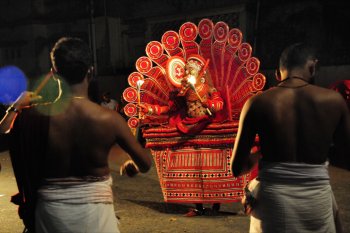 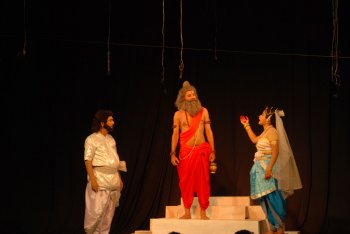 While the mellifluous rendering of Hazrat Amir Khusrau's poetry and Kathak dance in 'Aaj Rang Hai,' (Dir: Gopal Tewari and Purva Naresh for T-Pot Productions and Aarambh, Mumbai), had set a mellow mood for the evening as the opening performance of the festival, later at night, the 'Elam Kolam' and 'Karimkutty Sasthappan' Theyyam-s presented by Manoj Paniker and team from Kannur in north Kerala reverberated in the premises of Tagore Hall. The festival was formally inaugurated earlier in the evening with a host of leading veteran theatre personalities from the State joining hands to light the traditional lamp. Attention was focussed on Kashmir the next day, with the presence of MK Raina, senior theatre person and pedagogue who has been engaging in Community Theatre activities from Kashmir (also his native place) for the past decade and the staging of 'Aarcheekaal,' a Kashmiri play brought by Roshan Arts Centre from Pinjora in J & K. Directed by Reshi Rashid, whose involvement in theatre was directly linked to the community theatre activities of MK Raina, the play sought to narrate the story of Kashmir through the decades of its strife-torn existence right from the times of Maharaja Hari Singh. As part of their attempt to support the local culture, the play contained ample samples of local music, dance and costumes. 'Chandamama Dur Ke,' solo performance by Neeta Mohindra for Rangtoli, Amritsar, directed by MK Raina, drawing inspiration from the book, 'Letter to a Child Never Born' by the Italian journalist Oriana Fallaci was a dialogue between a mother and the unborn child in her womb. The 80 minute long performance was marked by Neeta's remarkable energy and controlled acting that never veered towards emotional hysterics even when handling a sensitive topic as these. 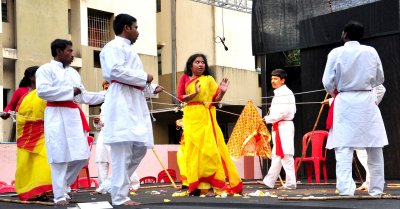 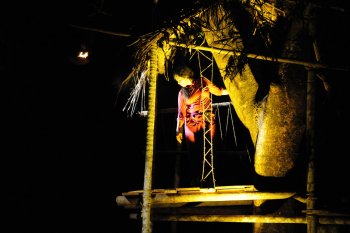 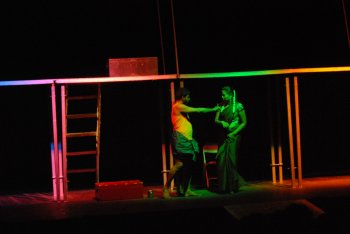 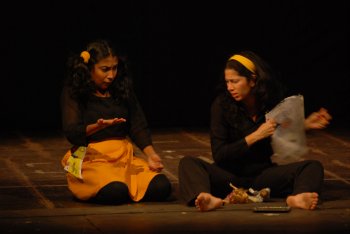 Interestingly, theme-wise, there was an apparent prominence of women-related subjects in this festival. Apart from 'Chandamama Dur Ke,' Sreelatha's 'Echo of the Day,' (conceptualised by Sreelatha, Sudhi CV and Rajarajeswari, for Daffodils and Nireeksha, Thiruvanathapuram), Tripurari Sharma's 'Roop Aroop,' (Sabdaakar Art and Cultural Society, New Delhi), 'Jameela: An Autobiography of A Sex Worker,' based on Nalini Jameela's real-life tale of a sex worker in Kerala (Dir: Gargi Bhardwaj for Loopholes, Hyderabad), Akvarious Production's 'All About Women,' (Dir: Hidaayat Sami) that told the tale of three women struggling to survive in the urban jungle of Mumbai and Rajiv Krishnan's 'Ms. Meena,' (for Perch, Chennai), all had women protagonists occupying the central space. And, 'Sonar Meye,' the interactive street theatre brought by Jana Sanskriti, Theatre of the Oppressed, under the leadership of Sanjoy Ganguly from Kolkata also dealt with the familiar story of the girl child and dowry-related issues. The Malayalam play 'Kalamkaariyude Katha' penned by Sreeja KV and directed by CM Narayanan for Kala Paatasaala, Arangottukara, was a poetic tale of a potter woman's bond to the craft of her hand. 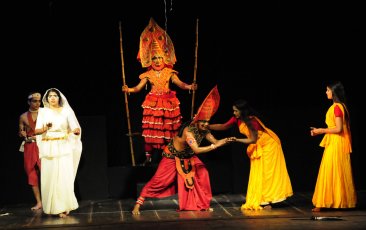 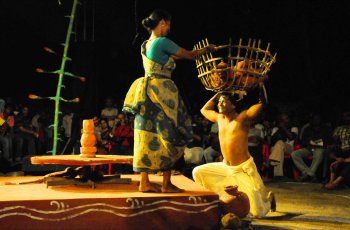 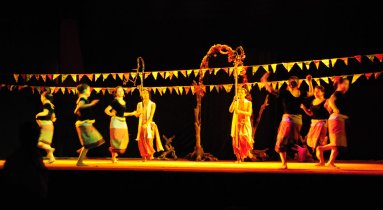 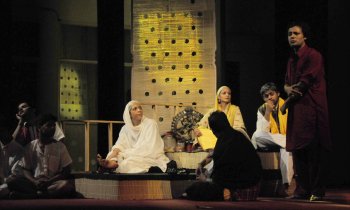 'Mirel Masingn-kha,' the non-verbal play from Manipur (Dir: Yumnam Leikai, for Kanglei Mime Theatre Repertory, Imphal) made use of the movement and discipline of the Manipuri martial art forms to narrate the story of the living legend Irom Sharmila of Manipur, who had been waging a fast for the past 10 years demanding the withdrawal of armed forces rule in the State. An important inclusion in the festival was 'Urubhangam,' the Sanskrit play directed by Kavalam Narayana Paniker for his group, Sopanam, Thiruvananthapuram. Paniker's rendering of the famous Bhasa classic 'Urubhangam,' is considered a fine sample of the 'Thanathu Nataka Vedi' (Theatre of Roots) movement that has been propagated by Paniker from the Seventies onwards. The team of Sopanam presented the play, first produced in 1987 with costumes designed by the late film maker G Aravindan who was a fellow traveller of the theatre movement in Kerala, maintaining the visual splendour and perfection that characterise Paniker's theatre language. Apart from Jana Sanskriti, Kerala Sasthra Sahithya Parishath, a leading NGO of Kerala that played a major role in educative and social terrains, was also invited to present their package of street plays dating back to the 1980s. These plays, containing strong messages of social emancipation and scientific awareness, had also played a major role in introducing a new sensibility of theatre among the common public. 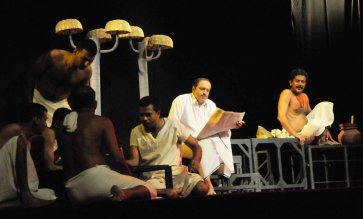 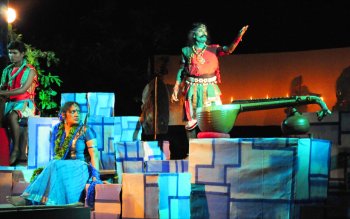 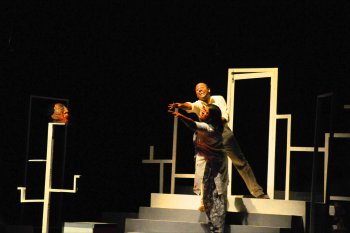 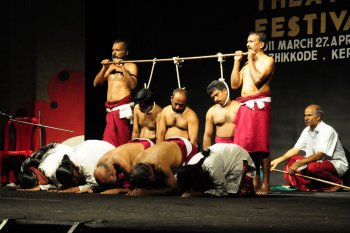 Among the Malayalam plays were 'Madhyadharanyazhi,' (scripted by Joy Mathew in 1994 and directed by A Rathanakaran for Deshaposhini Kalasamithi, Kozhikode) that dealt with the travails of middle class existence, 'Jeevacharithram,' that told the saga of a typical north Kerala village through decades of its life since Independence (Dir: S Sunil Kumar for Central Arts, Payyannur) and 'Lankalakshmi,' (the last of CN Sreekantan Nair's famed Ramayana trilogy, directed by Chandradasan for Lokadharmi, Kochi). 'About Ram,' directed by Anuroopa Roy, was another visual experience, with the story of Ramayana being re-told through the use of puppets, digitally projected miniature-style paintings and puppet manipulators appearing as actors. The Malayalam play, 'Lankalakshmi,' had also made use of the traditional Leather Shadow Puppets ('Tholappavakoothu') for depicting the battle scenes of Ramayana. However, Oxygen Theatre Company's 'Peer Gynt,' provided a novel theatrical experience for the audience with the scenographical experimentations of the director Deepan Sivaraman including the use of animal puppets and a variety of objects for narrating the Henrik Ibsen play. Transposing the 19th century play in contemporary India, Deepan has attempted to weave the current socio-political ambience into the life of Ibsen's Peer Gynt. More interesting is the re-telling of the original story as a 'second chance at life' begged by Peer Gynt from God at his death bed. 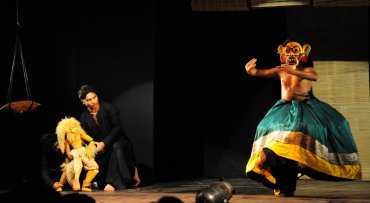 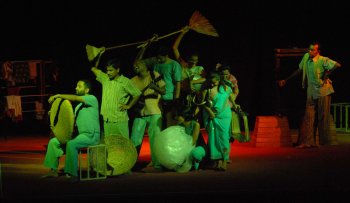 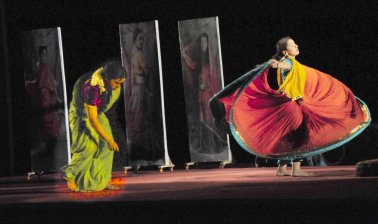 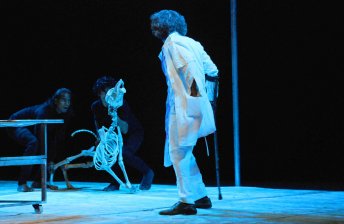 Rajiv Krishnan's 'Ms. Meena,' with its scintillating humour and Tamil-accented English, along with the brilliant use of property with which the actors created a village, forest, bus, train and the urban landscapes within seconds, also provided a wonderful theatre experience. Tripurari Sharma's 'Roop Aroop,' told of the confrontation between the male performer donning a female role and the woman street dancer aspiring to step into his shoes for survival. Sreelatha's 'Echo of the Day' that was inspired by the artist Sajitha Shankar's paintings and poetry, made use of the entire landscape outside the Tagore Hall as performance space. Moving across open ground, over tree tops and platforms, to the terrace of the main auditorium, this performance required the audience to follow the performer in her journey. The Theatre Talks included MK Raina speaking on 'Community and Theatre' describing his experience of working within the trouble torn social fabric of Jammu and Kashmir, Sanjoy Ganguly on 'Democratisation of Politics through Theatre' based on his discovery of the Theatre of the Oppressed as a tool to empower rural India, Tripurari Sharma on 'Women and Theatre,' Dr. MV Narayanan on 'New Technology and Theatre' and Deepan Sivaraman on 'Scenography in Indian Theatre.' Another attraction was the attempt to showcase the history of Kerala's contemporary theatre groups through photographs, program notices and press reviews displayed outside the festival venue. A Power Point presentation compiled by Alex Vallikunnam also gave a broad overview of the history of theatre in Kerala. A short documentary on the life of the maverick theatre person Jos Chiramel made by Alex was also screened. The concluding night was made colourful by the performance of Jatra, Bengal's popular theatre form. The story was 'Ganga Putra Bhishma: A Mythological Saga' directed by Animesh Bhardwaj. Renu Ramanath is a writer and columnist based in Kochi. She has covered art and culture extensively for The Hindu as a Staff Reporter in the Kochi bureau from 1996, writing reviews and features in The Hindu Friday Review and Sunday Magazine. Currently she edits Art Concerns, an online journal for contemporary Indian art. |